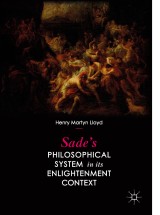Details

Sade's Philosophical System in its Enlightenment Context
|
85,59 € |
|
| Verlag: | Palgrave Macmillan |
| Format: | |
| Veröffentl.: | 05.09.2018 |
| ISBN/EAN: | 9783319971964 |
| Sprache: | englisch |
Dieses eBook enthält ein Wasserzeichen.
Beschreibungen
This book connects the philosophy of the Marquis de Sade—one of the most notorious, iconic, and yet poorly-understood figures within the history of European thought—with the broader themes of the Enlightenment. Rather than seeing himself as a mere pornographer, Sade understood himself as continuing the progressive tradition of French Enlightenment philosophy. Sade aspired to be a <i>philosophe</i>. This book uses intellectual history and the history of philosophy to reconstruct Sade’s philosophical ‘system’ and its historical context. Within the period’s discourse of sensibility Sade draws on the philosophical and the literary to form a relatively sophisticated ‘system’ which he deploys to critically engage with the two major strands of eighteenth-century ethical theory: the moral sense and natural law traditions. This work is of interest to: ‘Continental’ Philosophy, Critical Theory, French Studies, the History of Eighteenth-Century Philosophy, Literary Studies, the History of Moral Philosophy, and Enlightenment Studies.<p></p><p></p><p></p>
Part I: Introduction.- Chapter 1. The Problem of Sade.- Chapter 2. Sade’s Philosophical “System”- Part II: The Body of Sensibility: Ontology, Epistemology, Genre.- Chapter 3. Sensibility, Vitalist Medicine, and Embodied Epistemology.- Chapter 4. Sensibility, Genre, and the Roman Philosophique.- Introduction to Parts III & IV “Natural” and “Artificial” Morality in the Eighteenth Century.- Part III: Moral Sense, Pleasant Sensations, and Libertine Sensibility.- Chapter 5. Moral Sense Theory in the French Enlightenment.- Chapter 6. Rousseau’s Knowing Heart, Sade’s Knowing Body.- Chapter 7. Heart and Head, Love and Libertinage, in Histoire de Juliette Coda.- Part IV: The Authority of Nature: Sade’s Use and Critique of the Natural Law Tradition.- Chapter 8. Natural Law, and the Law and Voice of Nature.- Chapter 9. Living it up in the State of Nature: Sade contra Hobbes and Rousseau.- Chapter 10. Sadean Natural Law in Histoire de Juliette.- Part V. Ethical Self-Fashioning and the Problem of Libertine Sociability in Histoire de Juliette; or, Histoire de Juliette comme roman d’apprentissage.- Chapter 11. Sade’s Theory of Libertine Askesis.- Chapter 12. Juliette’s Ambiguous Apprenticeship.- “It is only you, my angel, […] that I forgive for loving me”: The Limited Success of Juliette’s Affective Self-Cultivation.- Part VI: Conclusion.- Chapter 13. Against the Dialectic of Enlightenment; or, How Not to Read Kant avec Sade.- Index<div><p></p></div>
<p>Henry Martyn Lloyd is Junior Research Fellow in Enlightenment Studies at the University of Sydney and an Honorary Research Fellow in Philosophy at the University of Queensland, Australia. He specialises in the History of Philosophy with a particular interest in the French Enlightenment and in traditions of ‘Continental’ philosophy.</p><p></p>
This book connects the philosophy of the Marquis de Sade—one of the most notorious, iconic, and yet poorly-understood figures within the history of European thought—with the broader themes of the Enlightenment. Rather than seeing himself as a mere pornographer, Sade understood himself as continuing the progressive tradition of French Enlightenment philosophy. Sade aspired to be a <i>philosophe</i>. This book uses intellectual history and the history of philosophy to reconstruct Sade’s philosophical ‘system’ and its historical context. Within the period’s discourse of sensibility Sade draws on the philosophical and the literary to form a relatively sophisticated ‘system’ which he deploys to critically engage with the two major strands of eighteenth-century ethical theory: the moral sense and natural law traditions. This work is of interest to: ‘Continental’ Philosophy, Critical Theory, French Studies, the History of Eighteenth-Century Philosophy, Literary Studies, the History of Moral Philosophy, and Enlightenment Studies. <p></p><p></p>
<p>Meets a market need: fills the gap for a substantial English-language study of Sade’s contribution to Enlightenment philosophy</p><p>Takes a rigorous approach: uses contextual intellectual history to reconstruct Sade’s philosophy in its Enlightenment setting</p><p>Provides a broad assessment: encompasses Sade’s non-libertine works such as Aline et Valcour as well as his major novel Historie de Juliette</p>
“Henry Martyn Lloyd’s richly textured, historically informed, and philosophically astute study succeeds where others have failed in situating Sade’s notorious corpus of works within the broader landscape of eighteenth-century thought. By laying out the ways in which his peculiar mélange of literature and philosophy was a response to the positions staked out by Rousseau, Condillac, d’Holbach, and other, less familiar contemporaries, Lloyd allows us to see Sade as an informed — albeit often idiosyncratic — participant in the arguments and approaches that shaped the late Enlightenment. The result is an insightful and engaging account of a thinker who was neither a stranger to the concerns of the Enlightenment nor a symptom of its alleged pathologies.” (Prof. James Schmidt, Boston University, USA)

















